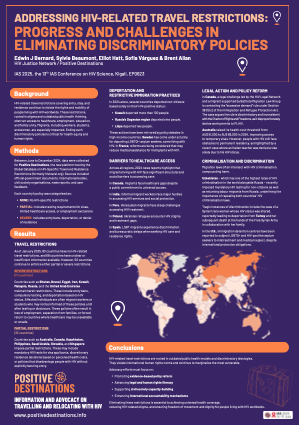Translated with Google Translate. Scroll down for article in Spanish.
NGO warns of increase in HIV cases in LGBTIQ+ migrants
The lack of delivery of medicines and preservatives to health entities would increase the risk among the diverse population.
The NGO Caribe Afirmativo, which defends the rights of LGBTIQ+ people (lesbians, gay, bisexuals, intersexuals, trans and queer), warned about the increase in HIV infections (Human Immunodeficiency Virus, which can cause AIDS) among migrants belonging to this population.
The warning was issued from the Migration Summit that takes place in Riohacha (La Guajira) by Wilson Castañeda, spokesman for Caribe Afirmativo, who pointed out that the prevalence of increase occurs especially among Venezuelan migrants living in Colombia.
For Caribe Afirmativo, which works to transform prejudices, imaginaries and social and institutional practices around sexual and gender diversity, the lack of delivery of medicines and condoms in health entities would be increasing the risk among migrants who make up the diverse population.
“When specifically looking at LGTBIQ+ migrants, it was identified that there was a prevalence that for every 10 migrants living with HIV, 5 were trans people,” Castañeda explained.
For the social activist, this “shows that in the universe of migrants living with HIV, 70% are LGTBIQ+ people.” He considered that “care must be reoriented to people of gender diversity, especially in countries such as Colombia.”
Castañeda called for the State to re-improve the attention to this population living with HIV, taking into account the increase figures that not only include migrants but also the returned population.
The NGO Caribe Afirmativo specified that one of the challenges facing Colombia in the face of HIV is access to medicines, taking into account that, despite the efforts of organizations such as AHF Colombia, obtaining antiretroviral medication for Venezuelan migrants is a constant challenge.
Another challenge would be the need for health and humanitarian care programs to support the provision of services and the distribution of treatments among this population.
ONG alerta aumento de casos de VIH en migrantes LGBTIQ+
La falta de entrega de medicamentos y preservativos en las entidades de salud, estaría aumentado el riesgo entre la población diversa.
La ONG Caribe Afirmativo, que defiende los derechos de las personas LGBTIQ+ (lesbianas, gais, bisexuales, intersexuales, trans y queer), advirtió sobre el incremento de infecciones con el VIH (Virus de Inmunodeficiencia Humana, que puede ocasionar sida) entre migrantes pertenecientes a esta población.
La advertencia fue lanzada desde la Cumbre Migratoria que se desarrolla en Riohacha (La Guajira) por parte de Wilson Castañeda, vocero de Caribe Afirmativo, quien señaló que la prevalencia de aumento se da especialmente entre los migrantes venezolanos radicados Colombia.
Para Caribe Afirmativo, que trabaja en transformar los prejuicios, imaginarios y prácticas sociales e institucionales en torno a la diversidad sexual y de género, la falta de entrega de medicamentos y preservativos en las entidades de salud estarían aumentando el riesgo entre los migrantes que conforman la población diversa.
“Cuando se miraba específicamente las personas migrantes LGTBIQ+ se identificaba que había una prevalencia de que cada 10 personas migrantes viviendo con VIH, 5 eran personas trans”, explicó Castañeda.
Para el activista social, esto “deja en evidencia que en el universo de migrantes viviendo con VIH, un 70% son personas LGTBIQ+”. Consideró que “hay que reorientar la atención a personas de diversidad de género, especialmente en países como Colombia”.
Castañeda llamó a que el Estado vuelva a mejorar la atención a esta población viviendo con VIH, teniendo en cuenta las cifras de aumento que no solo incluyen personas migrantes sino, además, población retornada.
La ONG Caribe Afirmativo precisó que uno de los desafíos que afronta Colombia frente al VIH son el acceso a medicamentos teniendo en cuenta que, a pesar de los esfuerzos de organizaciones como AHF Colombia, obtener la medicación antirretroviral para migrantes venezolanos es un desafío constante.
Otro de los desafíos sería la necesidad de programas de salud y atención humanitaria para fundamentar la prestación de servicios y la distribución de tratamientos entre esta población.
